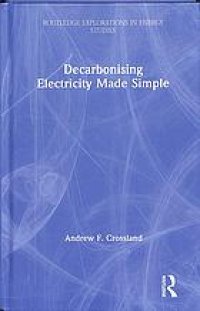
Ebook: Decarbonising electricity made simple
Author: Crossland Andrew F
- Tags: Electric power production -- Technological innovations., Renewable energy sources., Carbon dioxide mitigation., Electric power-plants -- Fuel., TECHNOLOGY / Electricity, TECHNOLOGY / Environmental Engineering & Technology
- Series: Routledge explorations in energy studies
- Year: 2020
- Publisher: Routledge
- Language: English
- pdf
This book assesses how low-carbon generation, the advance of energy storage and consumer-based models can help decarbonise electricity supplies at a national level. This book is built around developing a decarbonised electricity mix for Britain which reduces fossil fuels from 50% of supply in 2018 down to levels within 2030 carbon targets. Crossland explores the idea of a future energy storage mix which blends Read more...
Abstract: This book assesses how low-carbon generation, the advance of energy storage and consumer-based models can help decarbonise electricity supplies at a national level. This book is built around developing a decarbonised electricity mix for Britain which reduces fossil fuels from 50% of supply in 2018 down to levels within 2030 carbon targets. Crossland explores the idea of a future energy storage mix which blends domestic batteries, vehicles, thermal stores and pumped hydro to provide a flexible, responsive electricity system. He then goes on to look at how much storage can contribute to decarbonisation in a multitude of contexts - from domestic to national electricity. This book also discusses how efficiency and self-sufficiency can bring about a decarbonised electricity use within our homes today. Britain is used as the main example, but the themes and conclusions are applicable to a global audience, and each chapter draws on practical case studies from around the world to illustrate key ideas. Drawing on the author's experience in delivering and analysing low-carbon energy projects in the UK, Sub-Saharan Africa, Latin America and Oceania, this book will be of great relevance to students, scholars and industry specialists with an interest in energy technology, policy and storage